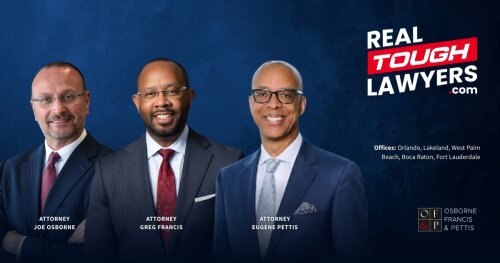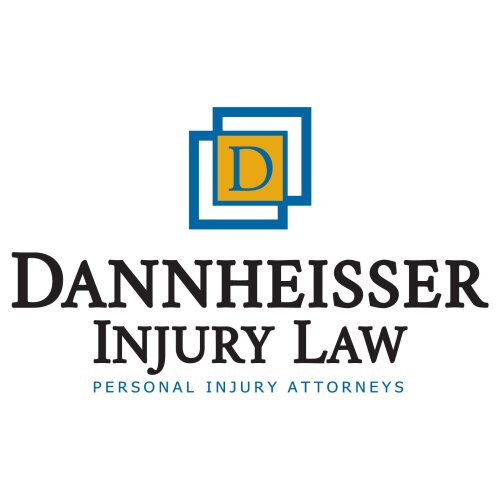Best Truck Accident Lawyers in Florida
Share your needs with us, get contacted by law firms.
Free. Takes 2 min.
Or refine your search by selecting a city:
List of the best lawyers in Florida, United States
About Truck Accident Law in Florida, United States
Truck accident law in Florida covers legal rules and procedures for individuals who have been involved in a collision with commercial trucks, semi trucks, or other large vehicles on Florida’s roads and highways. Due to the size and weight of these vehicles, truck accidents often result in serious injuries, property damage, or death. Florida law holds trucking companies and drivers to strict safety standards. If those standards are violated and cause an accident, victims may have the right to seek compensation for medical expenses, lost income, pain and suffering, and other losses.
Why You May Need a Lawyer
Truck accident cases are often more complicated than standard car accidents. Here are common situations where legal assistance may be needed:
- Negotiating with large insurance companies that may try to minimize your claim. - Determining liability when multiple parties are involved, such as the truck driver, trucking company, cargo loaders, or equipment manufacturers. - Investigating whether state and federal trucking regulations were violated. - Calculating damages, including current and future medical costs, lost wages, and pain and suffering. - Representing you in court if a fair settlement cannot be reached. - Understanding and meeting specific legal deadlines for filing claims. A lawyer can help protect your rights, gather evidence, and work to secure fair compensation.
Local Laws Overview
Florida has specific laws and regulations that affect truck accident cases:
- Florida is a “no-fault” insurance state, but serious truck accident injuries often meet the threshold for filing a lawsuit outside the no-fault system. - Comparative negligence laws in Florida allow you to recover damages even if you are partly at fault, though your recovery may be reduced in proportion to your degree of fault. - Deadlines to file a lawsuit, known as the statute of limitations, are usually four years from the date of the accident for personal injury and two years for wrongful death claims. - Both state and federal regulations govern the operation of commercial trucks, including hours of service, maintenance requirements, and driver qualifications. Violations of these regulations can affect liability.
Frequently Asked Questions
What should I do immediately after a truck accident in Florida?
Your safety comes first. Call 911, seek medical attention even for minor injuries, report the accident to law enforcement, gather evidence such as photos and witness information, and avoid discussing fault at the scene. Contact a lawyer as soon as possible for guidance.
Who can be held responsible for a truck accident?
Possible parties include the truck driver, trucking company, vehicle owners, cargo loaders, parts manufacturers, and maintenance providers. Liability depends on the specific facts of your case.
What if I am partially at fault for the accident?
Florida's comparative negligence law means you can still recover damages even if you are partly at fault, though your compensation will be reduced by your percentage of fault.
What kinds of compensation are available?
You may be able to recover compensation for medical bills, lost income, property damage, pain and suffering, rehabilitation costs, and in some cases, punitive damages.
How long do I have to file a lawsuit after a truck accident in Florida?
For personal injury, you generally have four years from the date of the accident to file a lawsuit. For wrongful death, the deadline is two years. Acting quickly is important to preserve evidence and protect your claim.
How is liability determined in a truck accident?
Liability is determined through investigation of evidence such as driver logs, maintenance records, black box data, accident reports, witness statements, and if violations of trucking regulations occurred.
Do I need to speak to the trucking company’s insurance adjuster?
You are not required to speak to the insurance adjuster before consulting a lawyer. Adjusters may try to get statements that minimize your claim. It is wise to seek legal advice before discussing details with them.
How much does it cost to hire a truck accident lawyer?
Many personal injury lawyers in Florida work on a contingency fee basis, meaning you pay no fees upfront and the lawyer is paid only if your case is successful, typically as a percentage of the recovered amount.
Is there a difference between a truck accident and a car accident case?
Yes. Truck accidents tend to involve more severe injuries, additional regulations, multiple liable parties, and complex insurance policies, requiring more in-depth legal investigation.
What evidence should I collect after a truck accident?
Collect accident scene photos, contact information for drivers and witnesses, police reports, medical records, and records of time missed from work. A lawyer can assist in obtaining additional evidence such as truck logs and maintenance records.
Additional Resources
If you need more information or want to report safety violations, these resources may be helpful:
- Florida Department of Highway Safety and Motor Vehicles (FLHSMV): For accident reporting and driver information. - Florida Bar Lawyer Referral Service: For finding qualified attorneys in your area. - Federal Motor Carrier Safety Administration (FMCSA): For rules that apply to commercial vehicles and reporting violations. - National Highway Traffic Safety Administration (NHTSA): For data, safety tips, and vehicle recall information.
Next Steps
If you or a loved one has been involved in a truck accident in Florida, consider the following steps:
1. Seek medical attention right away and keep detailed records. 2. Document as much of the accident as possible, including taking photos and gathering witness contact information. 3. Avoid discussing fault or signing documents from insurance representatives without legal advice. 4. Contact a lawyer experienced in truck accident cases to review your situation and explain your legal options. 5. Act quickly to ensure evidence is preserved and legal deadlines are met. With the guidance of a skilled truck accident lawyer, you can better protect your rights and improve your chances of obtaining fair compensation.
Lawzana helps you find the best lawyers and law firms in Florida through a curated and pre-screened list of qualified legal professionals. Our platform offers rankings and detailed profiles of attorneys and law firms, allowing you to compare based on practice areas, including Truck Accident, experience, and client feedback.
Each profile includes a description of the firm's areas of practice, client reviews, team members and partners, year of establishment, spoken languages, office locations, contact information, social media presence, and any published articles or resources. Most firms on our platform speak English and are experienced in both local and international legal matters.
Get a quote from top-rated law firms in Florida, United States — quickly, securely, and without unnecessary hassle.
Disclaimer:
The information provided on this page is for general informational purposes only and does not constitute legal advice. While we strive to ensure the accuracy and relevance of the content, legal information may change over time, and interpretations of the law can vary. You should always consult with a qualified legal professional for advice specific to your situation.
We disclaim all liability for actions taken or not taken based on the content of this page. If you believe any information is incorrect or outdated, please contact us, and we will review and update it where appropriate.
Browse truck accident law firms by city in Florida
Refine your search by selecting a city.















